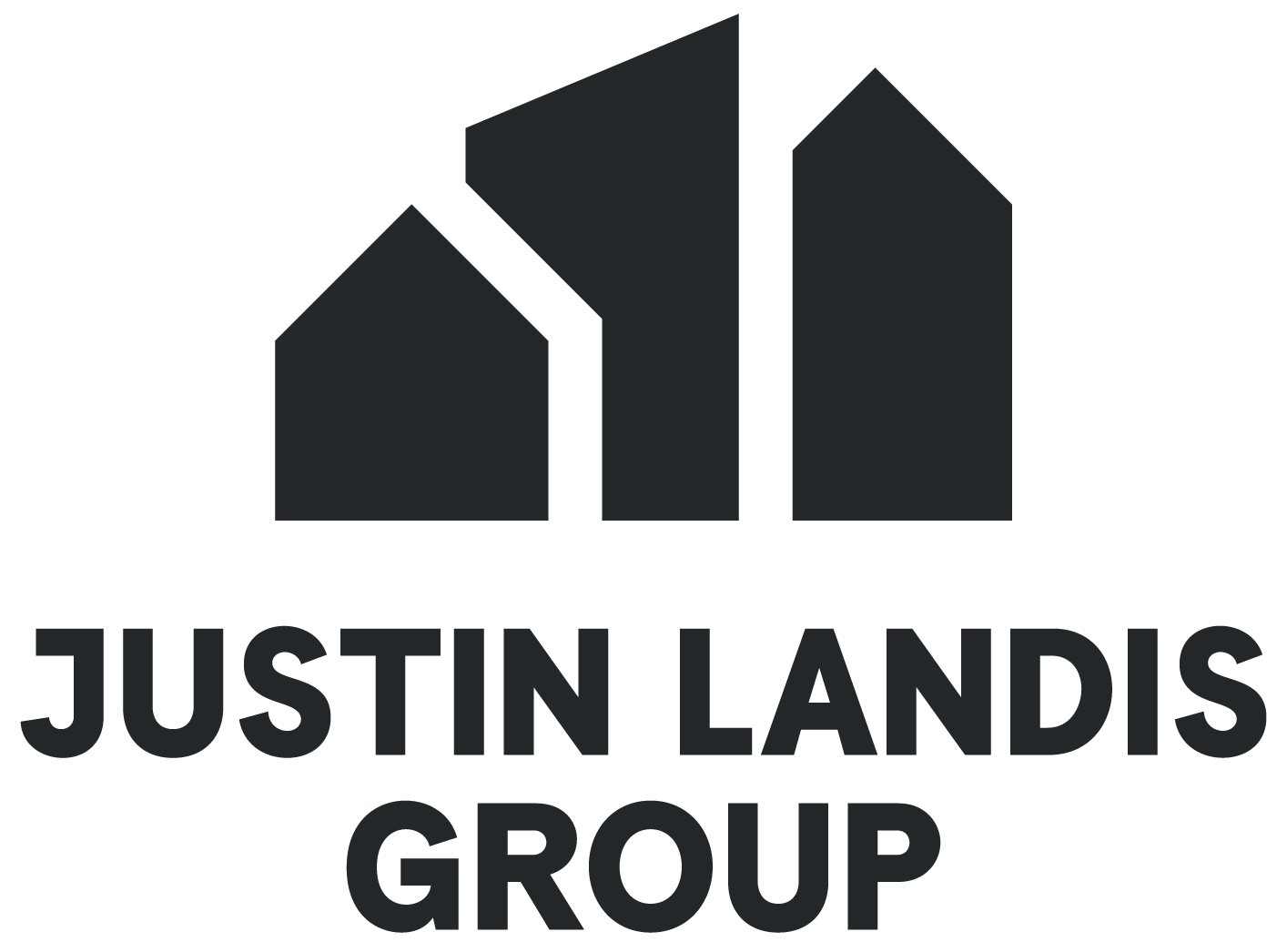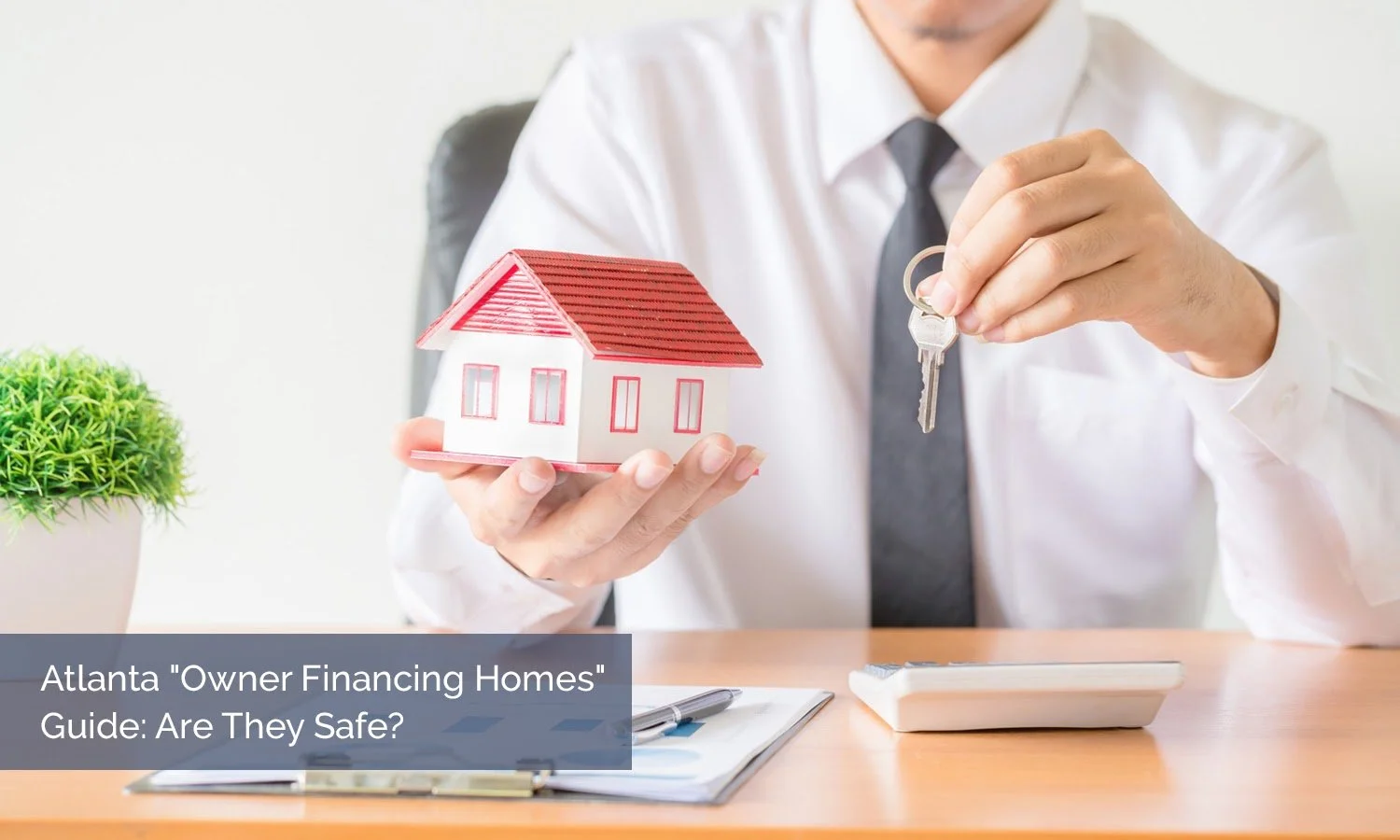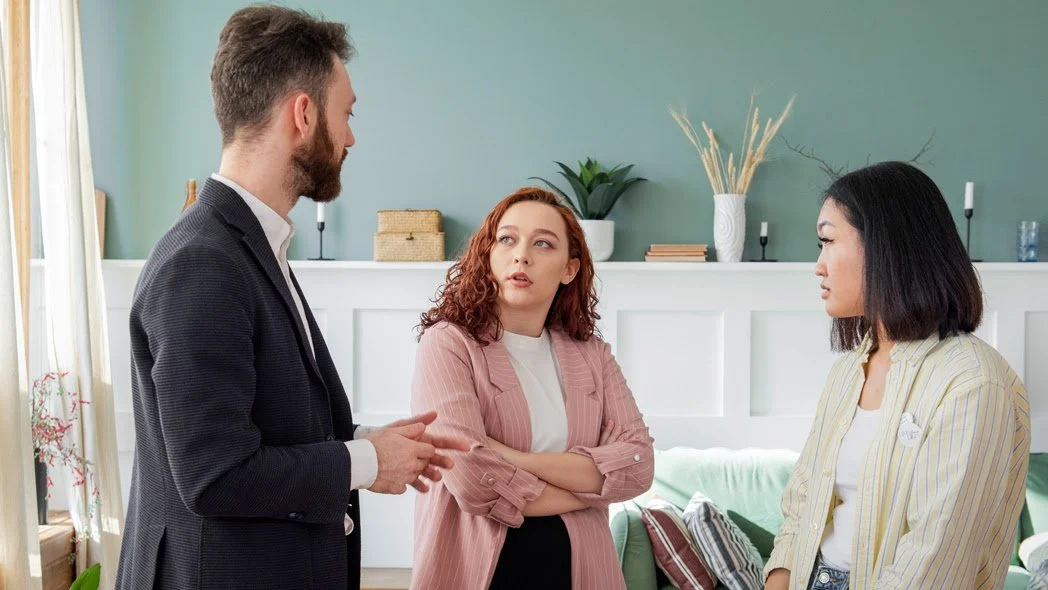Atlanta "Owner Financing Homes" Guide: Are They Safe?
Owner financing" is a simple way of saying that sellers carry out property deals without the need for banks or mortgage companies. They reach an agreement with the buyers on the payment terms and conditions - it's pretty direct and uncomplicated when you think about it.
But, stepping away from the normal way of doing things can bring up problems. Picture owner financing like this: the role of the property seller is basically that of a banker. Not what you'd usually imagine, right? But it's less strange than you might think. The buyers make a vow to send payments to the sellers over a set amount of time by signing a contract. This agreement typically includes an interest rate.
So, what's the real deal for a future homebuyer who's finding it tough to get a regular loan? Like any matter dealing with money, it could be quiet and uneventful or wild and chaotic. So - which will it be this go-round?
Time to switch gears to Atlanta. The burning question: is owner financing a safe option in this city?
What is Owner Financing?
Okay, let's dig into this: What is owner financing? Well, it's a deal between the buyer and the seller. In this situation, the buyer doesn't get a loan from a bank or a mortgage lender. Nope; instead, the seller steps in to play that role. You might be scratching your head and asking, "What does that mean, exactly?"
Well, let's get this straight: the seller funds the purchase. They back the sale, and the buyer pays back the property in installments - that goes right back to the seller. Now, this is a far cry from the usual mortgage that involves a bank; with those, the borrower has to pay back a loan they got to buy the property.
But hang on - you might be asking who benefits from this setup. Aren't mortgages usually the way to go? Yes, usually - but owner financing is a safety net for people who can't get a traditional mortgage.
You might be wondering why some people can't lock down a mortgage. Well, there are many reasons - low credit scores, irregular income, being self-employed, or having a recent bankruptcy. Faced with these realities, the rigid requirements of banks can be too steep to climb.
But here's where owner financing sweeps in as a powerful workaround. And why is that? With owner financing, sellers often overlook problems like these, focusing more on closing the sale and setting up a steady stream of payments.
With this setup, a buyer who might not ordinarily get a house could now have a chance at it. At the same time, the seller can make a profit in the long run. Doesn't that show how flexible and varied the real estate market can provide solutions?
Don't forget that owner financing has many uses beyond a handy fix. It's not a one-size-fits-all solution for every buyer or seller. There are many things to consider - like the interest rates, contract terms, and possibilities for future sales.
The SAFE Act and Its Implications
The SAFE Act (Secure and Fair Enforcement for Mortgage Licensing Act) arrived during the 2008 financial crisis. You may ask why such an Act was established.
It was down to a big mess in the housing market – mostly caused by reckless loaning, which introduced the Act. Take Georgia, for instance – it was in turmoil due to loosened regulations and subprime loans. Within no time, in 2009 to be exact, the state welcomed the SAFE Act into its laws, highlighting the need for consumer safety and better supervision of lending methods.
So, how exactly does the SAFE Act come into play in owner financing, from an investor's point of view, you may wonder?
The Act brings in firm licensing and registration rules for people who grant mortgage loans. So, someone without a license can't legally set up owner-financing agreements any longer. This ruling particularly impacts investors hoping to offer owner financing after purchasing a property.
Does this mean a full-on disaster for investors who quickly flip properties, hoping to provide owner financing? Not really. While the Act does create some bumps in the road, it doesn't completely do away with owner financing. A few sale setups – like a homeowner vending their primary residence themselves or an investor selling via a land trust or a wrap-around mortgage – are allowed exceptions under the SAFE Act.
But – it does make things more difficult for an investor buying multiple properties intending to use owner financing. They need help from a licensed mortgage loan originator or become one themselves. Here, the SAFE Act's true purpose is to encourage transparency, improve responsibility, and enable secure deals.
The SAFE Act has made a big difference in owner financing. Yes, it did pile on more rules, but it also made us realize how important consumer safety is. Finding a balance between opportunity and responsibility is important here, don't you agree?
This Act wasn't out to crush owner financing. It wanted to keep it under control. It extended the reach of the law in areas that were starting to act a little out of line.
Buyer Benefits of Owner Financing
With owner financing, the main benefit is that you're in for a quicker ride. You get this speed because of less complicated talks and fewer delays, unlike with bank loans and the long underwriting and approval process. Imagine getting set for your move into that new place sooner than planned - amazing, huh?
Next, think about this - you know those extra costs at a standard deal's closing? Well, wouldn't it be great to sidestep those kinds of fees? That's exactly what you can do with owner financing; you save more money because this deal style usually has fewer additional costs. You duck a slew of bank-related fees by dealing directly with the seller. The down payment details are another big time, plus with owner financing - it feels freeing. This layout lets everybody find a happy middle ground, so you take care of your money situation without bending your budget.
About another advantage - it's a pretty big deal. Maybe your credit score isn't exactly top-notch, or your income jumps around a bit. Under normal circumstances, buying a house might feel like an impossible mission. Banks don't usually give people like us a break, do they? But with owner financing, you could have a straight shot at owning your own place. It's an attractive option that could let you buy a house, even though you have money troubles or an up-and-down income.
No one denies that traditional mortgage loans are popular- they're a solid option. But it's clear as day that owner financing gives you a few unique perks that you might appreciate. I'm talking about the chance for a quicker closing process, fewer out-of-pocket expenses, adaptable down payment setups, and the fact that you can go for it even with a not-so-great credit score.
Potential Downfalls for Buyers
Eyeing those owner-financed homes in Atlanta, aren't you? It seems like an easy way to own a home, but it has potential risks. If a bank rejects your mortgage application, you might consider owner financing as an appealing alternative. But have you dug into the hidden aspects of this tantalizing option?
Visualize a scenario with soaring interest rates. Regular bank mortgage rates follow the rules. But, with owner financing, the ball is in the seller's court as they get to dictate the interest rate, which is routinely higher than what a bank might quote. The reason behind this lies in the risk they're taking on you. Are you prepared to cough up some extra cash for the bonus interest?
Next up in your ordeal are challenging repayment plans. Often, these agreements favor the sellers, leaving the buyers in a tricky spot. These harsh repayment conditions might demand a hefty down payment and a narrower repayment frame. Have you got the grit and grind to handle reimbursement in this pressure cooker scenario?
Keep in mind that falling behind on loan repayments can lead to severe consequences. Once you falter, foreclosure might loom, and your entire investment - your initial payment and the money you've put into renovating the property - could bite the dust. It hits like a ton of bricks, doesn't it?
Here comes the kicker. Suppose you've diligently poured a ton of money into paying off a big chunk of your loan and transforming that house into your dream home, and then disaster strikes. A sudden job loss, an illness, or a financial crunch might leave you unable to keep up with your repayment duties. And it's clear as day that the property isn't truly in your name yet. The title remains with the seller till every penny of the loan is paid off. So, brace yourself for the harsh reality that your dream house may still slip through your fingers regardless of years of repayments. Not all seller-financed deals are straight-up nightmares. Some work out fine, boasting reasonable interest rates and manageable payment plans. But you need to be aware of these potential pitfalls and be prepared for any troubles lurking in the shadows.
Seller's Perspective - Risks and Rewards
Many homeowners have begun to tap into the untapped possibilities of owner financing - serious stuff. Not familiar to many, owner financing is an unused income source, and most of the income comes from the interest the buyer pays on the mortgage. If you finance a home, you step into a bank's shoes. The buyer's monthly mortgage payments are a source of income for the seller, slowly but surely creating a handy cash flow - big time.
The potential for extra income exists, but the owner-seller has to accept a major role. If the buyer can't make the payment, look no further - it's the seller's task to manage the default. How does this impact the seller, you might ask? Managing the default becomes the seller's duty if the buyer doesn't repay the mortgage. This responsibility could mean many foreclosure costs and long legal processes - a real drag.
Here's another potential risk: the property could lose value while the buyer manages it. If the buyer can't pay and the house's value drops, maybe because it wasn't taken care of or was damaged, the responsibility falls on the owner-seller to make the house sellable again, in terms of money and condition. Is every seller ready to jump into that?
Here's the thing: owner financing is neither inherently good nor bad. It's a tool that could be used right or wrong. Yes, earning interest income is tempting. But the combined responsibilities and risks aren't something to overlook. To use owner financing properly, understanding all aspects - from the shining opportunities to the potentially ugly risks - is important.
So Are They Safe?
They can be safe, but the details of the deal and how you and the vendor manage it make the difference. Owner financing can be a good option, offering up another money path when banks aren't handing out loans. For sellers, it often makes selling easier in buyer-friendly markets, and this could be a real help when other routes look tough.
Though, nothing's perfect. There are clear hazards in owner-financed homes. Sellers might face the scary thought of foreclosure if the buyer can't stick with the payments. On top of that, sellers could find their money tied down, slowing down their chance to invest elsewhere. But don't think buyers get off easy; they could also run into shifty sellers, bumped-up interest rates, and the chance of taking on unforeseen debts if they don't dig deep enough.
Staying alert and understanding the pitfalls is super important. How severe are these risks linked back to the terms of the contract and the knowledge about the property that each party has? I'm talking about unfair lending practices; they're real—sometimes not so obvious—in Atlanta's owner-financed market. Bad deal conditions or legal complications could stick buyers with a looming mortgage or leave sellers short on cash.
But is picking an owner-financed home in Atlanta a safe bet? The answer isn't an easy one. With lots of research, solid legal advice, and clever financial planning, owner financing can become a safe and sensible option.
Still, the chance of rough patches stresses the need to be watchful and make careful decisions. You could say it's a decision that takes some nerve.
Closing Remarks and Best Practices
Buying a home in Atlanta using owner financing can be safe if you're careful about details. You need to understand all the terms and stuff in the contract well. Ask tons of questions - it'll help you stay out of trouble. Every money deal has risks, even when homeowners sell their places directly.
Knowing the practical stuff can help you avoid these risks. Chatting with real estate lawyers or money experts can help; these pros ensure the deal is fair and good for you. They guide you through all the legal and financial terms to keep you safe. You'll want these pros on your side, won't you?
Atlanta is an awesome city buzzing with life and energy. Thinking about making this exciting city your home? Each neighborhood has its cool feel, and every corner has its tale. You need someone to show you around to get how special Atlanta is. That's where the Justin Landis Group steps in - we're about more than just selling homes. I'm talking about understanding you and finding a home that fits.
Whether you're hunting for a quiet suburban spot or a place smack in the middle of the city action, our team can guide you. There's an awesome adventure waiting for you here in our great city; ready to jump in? Chat with the Justin Landis Group now and take the first step towards finding your dream home where the vibe of Atlanta is felt in every room. We can't wait to open the door to your new dream home! Contact us today to see what we can do for you.








